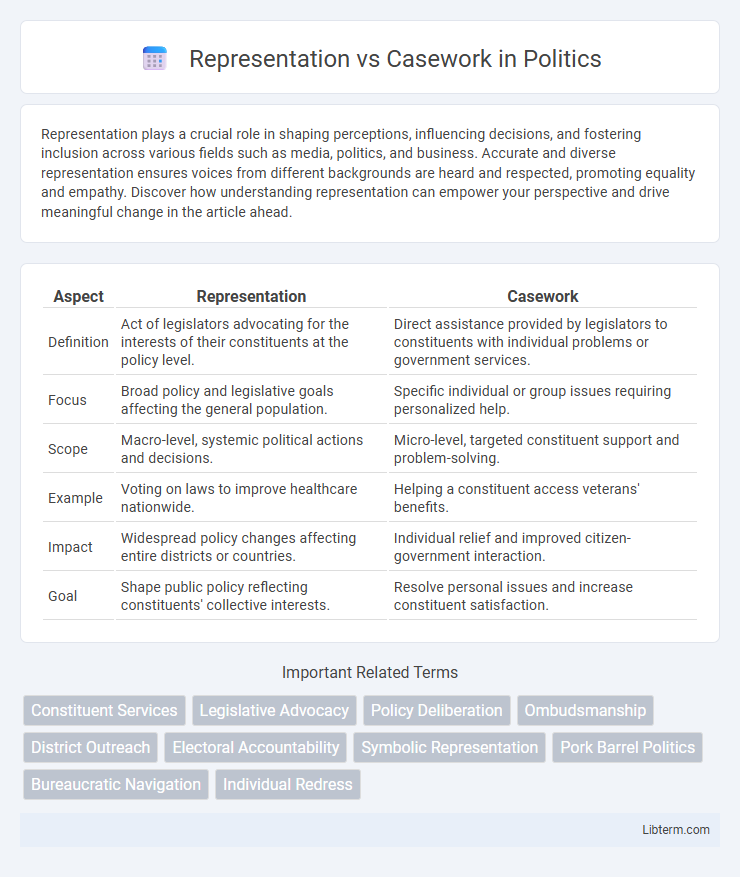Representation plays a crucial role in shaping perceptions, influencing decisions, and fostering inclusion across various fields such as media, politics, and business. Accurate and diverse representation ensures voices from different backgrounds are heard and respected, promoting equality and empathy. Discover how understanding representation can empower your perspective and drive meaningful change in the article ahead.
Table of Comparison
| Aspect | Representation | Casework |
|---|---|---|
| Definition | Act of legislators advocating for the interests of their constituents at the policy level. | Direct assistance provided by legislators to constituents with individual problems or government services. |
| Focus | Broad policy and legislative goals affecting the general population. | Specific individual or group issues requiring personalized help. |
| Scope | Macro-level, systemic political actions and decisions. | Micro-level, targeted constituent support and problem-solving. |
| Example | Voting on laws to improve healthcare nationwide. | Helping a constituent access veterans' benefits. |
| Impact | Widespread policy changes affecting entire districts or countries. | Individual relief and improved citizen-government interaction. |
| Goal | Shape public policy reflecting constituents' collective interests. | Resolve personal issues and increase constituent satisfaction. |
Understanding Representation in Politics
Representation in politics entails elected officials acting on behalf of their constituents' interests, values, and needs within legislative processes. It involves policy-making that reflects the collective will and demographic characteristics of the represented population. Effective representation ensures accountability, responsiveness, and the translation of public preferences into governmental action.
Defining Casework: A Core Legislative Function
Casework is a core legislative function involving direct assistance provided by legislators to constituents dealing with government agencies or navigating public services. This personalized support helps resolve individual issues such as social security claims, veterans' benefits, or immigration problems, reinforcing the legislator's role as a responsive advocate. Effective casework strengthens constituent relationships and enhances public trust in legislative representation.
Historical Evolution of Representation and Casework
The historical evolution of representation and casework reflects the transformation of democratic governance from indirect, elite-driven representation to more direct, personalized citizen engagement. Early political systems prioritized broad policy representation through elected officials, while increasing urbanization and social complexity in the 19th and 20th centuries elevated the importance of casework as lawmakers began addressing individual constituents' specific concerns. This shift intensified with the rise of welfare states and mass media, making casework a crucial method for politicians to maintain voter support and responsiveness beyond legislative duties.
The Roles of Elected Officials: Balancing Duties
Elected officials balance their roles by representing broad constituent interests through policy-making and addressing individual concerns via casework, ensuring both community-wide and personal needs are met. Representation involves advocating for legislative priorities that reflect the values and preferences of the electorate, while casework provides direct assistance to constituents facing government-related issues. This dual approach strengthens trust and responsiveness, enhancing democratic governance.
Representation: Advocating for Policy Change
Representation centers on influencing legislation and public policy to address systemic issues affecting communities, leveraging advocacy and lobbying to create long-term solutions. By engaging with lawmakers and shaping policy agendas, representatives work to enact laws that promote social justice, economic equality, and public welfare. This approach aims to drive structural change rather than providing direct individual assistance.
Casework: Addressing Constituent Needs
Casework involves direct assistance to constituents by resolving individual problems related to government services, such as Social Security, veterans' benefits, or immigration issues. This personalized support helps strengthen trust between elected officials and their communities while ensuring access to essential public resources. Effective casework increases constituent satisfaction by addressing specific needs promptly and navigating complex bureaucratic systems.
Comparing Impact: Representation vs Casework
Representation and casework serve distinct but complementary roles in political impact. Representation shapes broad policy outcomes by advocating for constituents' interests at the legislative level, while casework directly addresses individual or local problems, enhancing personalized voter support and responsiveness. Analyzing their impact reveals that effective representation drives systemic change, whereas casework builds trust through tangible assistance, each influencing political legitimacy and public satisfaction in unique ways.
Challenges Faced in Effective Representation
Effective representation faces challenges such as balancing constituent casework demands with broader legislative priorities, often leading to resource allocation conflicts. Representatives must navigate bureaucratic complexities and limited staff capacity, which hinder timely responses to individual concerns. Maintaining transparent communication and managing diverse constituent expectations also complicate the delivery of equitable representation across all community segments.
Casework Success Stories and Their Significance
Casework success stories highlight how elected officials directly address individual constituents' problems, such as resolving Social Security issues, securing veterans' benefits, or expediting immigration processes. These personalized interventions demonstrate the tangible impact of government responsiveness and enhance public trust in political representatives. Showcasing casework victories underscores the vital role of constituent services in strengthening democratic engagement and accountability.
Enhancing Democratic Accountability through Representation and Casework
Representation fosters democratic accountability by ensuring elected officials link policy decisions to constituent interests, reflecting the collective preferences of the electorate. Casework enhances democratic accountability by addressing individual constituents' needs, promoting responsiveness and trust in public officials. Together, representation and casework strengthen democratic governance by balancing broad policy oversight with personalized constituent engagement.
Representation Infographic

 libterm.com
libterm.com